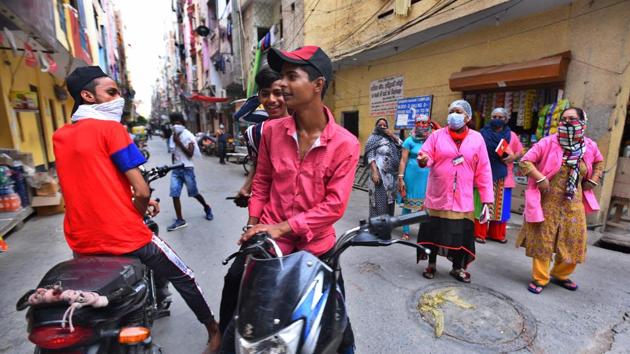Covid-19: The daredevils who defy scientific advice
Many continue to go about their lives, refusing to follow simple preventive health guidelines, as if the world is already in a post-pandemic era
India’s Covid-19 cases are rising. Balram Bhargava, director-general of the Indian Council of Medical Research, has attributed the spread to irresponsible citizens who refuse to follow the mandated preventive health guidelines of wearing masks and maintaining social distance. He said, “I wouldn’t say young or old, but irresponsible, less-cautious people who are not wearing masks are driving the pandemic in India”.

Long is a recent adjective being used to describe Covid-19 because of its impact on the body much after being tested negative, and despite the body having enough antibodies. According to recent findings, recovered people may continue to suffer from severe lung and heart damage, muscle ache, energy loss, breathlessness, memory issues, even psychological distress. This new information should instill fear, and motivate everyone to adopt all suggested preventive health behaviours such as wearing a mask, frequent hand washing, and maintaining social distance very sincerely.
Yet, many continue to go about their lives, refusing to follow simple preventive health guidelines, as if the world is already in a post-pandemic era. I am going to take the liberty to call all such people daredevils. Daredevils, by definition, are reckless people who enjoy doing dangerous things.
What is the link between a daredevil’s cognition of the ongoing pandemic and his motivation to be such a daredevil? In other words, what makes a daredevil expect a favourable outcome, of not getting infected, despite reckless behaviour? Prior research finds people can have favourable expectancies because of, and not limited to, any of these reasons — their self-belief and personal efficacy; because they think they are lucky; because they think they are favoured by God. According to Scheier and Carver (1987), the reason for favourable expectancies can be any of these but all of them will lead to an optimistic orientation—that is, a general expectation that only good things will happen to me.
An optimistic orientation, that instills a positive outlook about the future, has been found to affect health decisions related to smoking, diet, and exercise, and explains why individuals make choices that may have adverse effects on their health. It is quite plausible, and some recent research suggests so, that our daredevil may have a misplaced perception of the severity of Covid-19, almost like a denial, that may, in fact, be attributed to a high optimistic orientation. Such biases in the perception of risk have been observed historically in other pandemics too.
According to a health communication framework called Protection Motivation Theory, people tend to protect themselves based on their perception of the severity of a threatening event, the perceived vulnerability related to the occurrence of the event, the efficacy of the recommended preventive behaviour, and their self-efficacy. This theory lends an understanding of preventive health behaviour being displayed during the ongoing pandemic.
In a recent study, Jovancevic and Milicevic (2020) confirm a high optimistic orientation among Serbians who defied social distancing guidelines and received guests, despite fully comprehending the negative health consequences associated with this behaviour. Is our daredevil so optimistically oriented that he is unable to comprehend his vulnerability to Covid-19? Is the daredevil’s optimistic orientation one of the reasons that may be enabling his reckless behaviour of not wearing a mask and not maintaining social distance? If this is true, then a possible solution lies in an alternative creative approach to the current public service announcements and communication material developed by health agencies, central and state governments to support Covid-19 prevention and recommendations. Simply put, the advertisement’s copy, creative design, message appeal, and executional framework can centre around how not to be a daredevil.
The views expressed are personal






